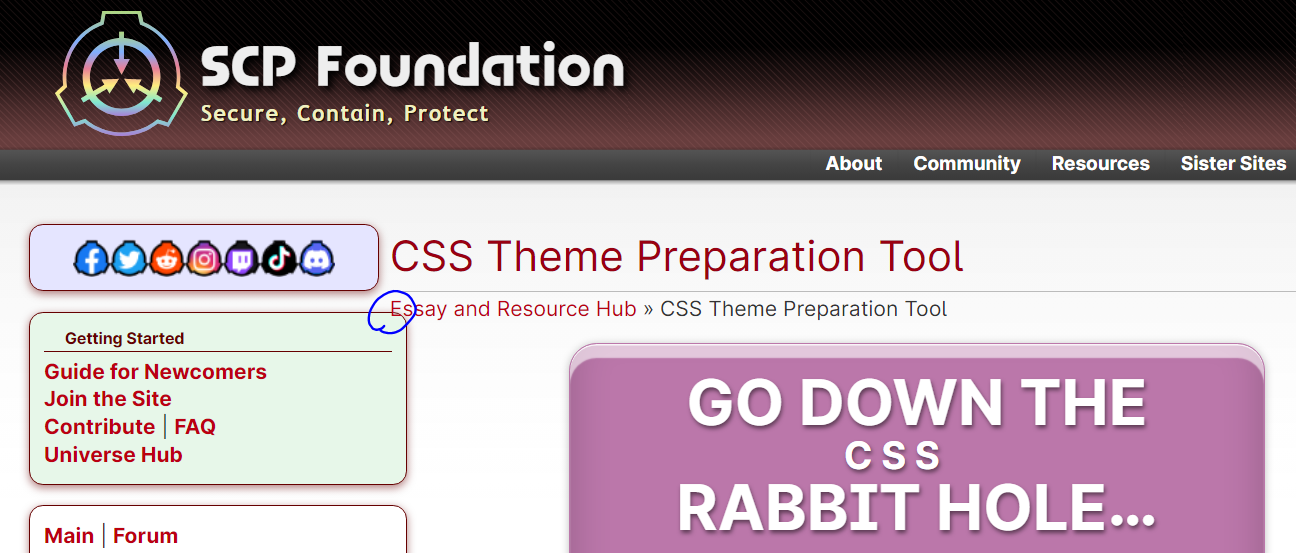A Brief and Objective Guide to Essays on the SCP Wiki

Introduction
The SCP Wiki has two major types of explanatory pages: "guides", which are endorsed by staff and are intended to be broadly applicable, and "essays", which represent the opinions of the author(s) and may or may not have a wide audience. A few essays which were posted to the wiki recently have bombed and gotten deleted, which made me wonder: what else have essay writers been getting up to?
So I decided to find out by... well, not READING all of the essays on the site, because there are a ton of them, but at least skimming them and refreshing my memory. I wrote down my opinions on each essay, which are all incredibly thoughtful and not polluted with any of my insane personal beliefs or forum drama. Additionally, you'll notice some dancing letters in the corner of each writeup. Rather than offer a summary judgment on their quality, which feels unfair given how old some of them are, I decided to weigh in on whether they represent a 'W' or 'L' for the author and/or community. These ratings are all insightful and will invariably age incredibly well.

Abolish The No Vote, Downvote Your Friends, and Other Musings
BY: Anonymous
SUMMARY: A persuasive essay encouraging users to always vote on articles they read — in particular, that people should be willing to downvote articles that are not up to snuff, even if they have redeeming qualities.
ANALYSIS: Basically correct, and received fairly well, but failed to change the site culture in any observable fashion because almost nobody actually reads essays. The author would later go on to throw an extended tantrum, unsuccessfully try to have most of her output removed from the wiki, and join a hate website. This also goes for all the other Anonymous essays here, but I don't feel like repeating it, so just keep that in mind.

About 3333
BY: Jekeled
SUMMARY: Jekeled describes the history of SCP-3333 and offers an in-depth look at the thought processes behind its writing and rewriting.
ANALYSIS: I have a weakness for talking shop about the process of writing SCPs, so this is like candy for me and serves as a great demonstration of the care and consideration that should go into every moderately serious article. For those of you who (for some reason) aren't especially interested in watching a talented author build up their work and break it back down, there's a lot of worthwhile introspection to tide you over. I consider this essential reading for any current or aspiring SCP author.

A Brief History Of Foundation RP
BY: Anonymous
SUMMARY: A brief history of Foundation RP.
ANALYSIS: Through no fault of its own, this is far too cringe for me to engage with seriously. Things from the various SCP roleplays have made it onto the site and had an impact, but I maintain that roleplays are best left forgotten at any cost. Not worth reading.

A Brief History Of SCP-KO
BY: Anonymous
SUMMARY: A brief history of the Korean branch.
ANALYSIS: Contains no events of interest, the rating module was broken from a capitalization error for like a decade until I pointed it out in this essay, and the licensing box has been broken for the three years it's been around too (though it might also get fixed, due to my incredible powers). Nobody gives a fuck about this and neither should you.

A Brief History Of SCP-RU
BY: Anonymous
SUMMARY: A brief history of the Russian branch.
ANALYSIS: Like the -KO entry, not especially interesting. At least the formatting isn't broken.

A Brief History of the German Branch
BY: Dr_Grom
SUMMARY: A brief history of the German branch.
ANALYSIS: I didn't read this because I do not give a fuck about what Germans think of anything.

A Dime A Dozen: An Essay On Critiquing Ideas, Community, and Making The Most Out Of Nothing
BY: RockTeethMothEyes
SUMMARY: A somewhat-outdated (by the author's own admission) rundown of the Ideas Critique forum, including what kind of threads happen there and how to handle them.
ANALYSIS: I've never used the Ideas Critique forum for anything other than finding dumb shit to laugh at, and frankly don't think too highly of its utility for anything else. The dirty secret of SCP critique is that the only good way of getting it is to make friends with skilled authors and ask them for help directly; the dirtier secret is that you should just get good enough at writing that you don't actually need critique. But if you're going to engage with that forum sincerely, I think this is a well-written and approachable guide for doing so.




Advanced Formatting and You
BY: DrMagnus
SUMMARY: A technical guide on how to use some basic CSS and external code on Wikidot.
ANALYSIS: You shouldn't need to use almost any of this, but if it strikes your fancy, this will do the trick.

A Few Examples Of Things Not To Do In An SCP And What To Do Instead
BY: Randomini
SUMMARY: A rundown of basic errors often committed by new and/or sloppy SCP authors and how to avoid them.
ANALYSIS: The target audience for this is exceptionally precocious 16-year-olds who can't write a decent SCP to save their life, but are very intent on doing so someday. This is maybe a dozen people, including myself (circa 2011) and some other authors you've probably heard of. The thing is, these are people who are going to make it one way or another, because they're generally bright and serious about getting better. If someone can't eventually figure out how to avoid most of these problems on their own, they're probably not smart enough to be a good author anyways. The essay isn't hurting anything, but I sincerely doubt this really made a difference in any author's trajectory.

An exercise in narrative based SCPs
BY: Leveritas
SUMMARY: Encourages writers to craft SCPs by coming up with a narrative first and gives some examples of how to do so.
ANALYSIS: Maybe I'm just built different, but this doesn't really apply to me. "Your SCP should have a narrative" is a popular meme because it's easy to tell when an SCP has a boring anomaly or the same one as an existing entry, but it's hard to tell when it's retreading the same story or telling a bad one. For people who are not especially skilled at crafting either, focusing on the latter is a good way to forestall the "we already have one" complaints and elevate a subpar author to adequacy. It also appeals to humanities majors, who often have to overcome their instinctual distrust of object-centric storytelling to write in the SCP format at all. Some writers might prefer narrative-centric articles for reasons I can't half-jokingly dismiss, but I doubt it. Anyways, this is just a worse version of my untitled essay (discussed later) because its practical advice is worse.

An Interview With Billith On Narrativistics
BY: Billith and the SCP-VN News Team
SUMMARY: The Vietnamese branch's News Team conducts a very long interview with Billith about "narrativistics", a thing which does not exist.
ANALYSIS: This seemed really fucking stupid so I didn't read it.

An Interview With "The Administrator"
BY: Anonymous and FritzWillie / TheAdministrator
SUMMARY: An interview with early author and SCP Wiki creator FritzWillie / TheAdministrator about his history with the site.
ANALYSIS: If you're interested in the early days of the wiki, this is some pretty cool insight; beyond that, there are some really interesting details about FritzWillie's personal life. I actually found him on Twitter not too long ago and it turns out these days he just draws and shares pinups of retro anime girls, which is nice.

Anomaly Classification System (ACS) Guide
BY: Woedenaz
SUMMARY: An extended breakdown explaining the meaning of the ACS bars that some people put on top of their articles, as well as hosting additional icons made by other people.
ANALYSIS: The ACS bar is a narrative device used to move the actual content of the SCP further down in the article by filling a chunk of space with pointless words and symbols. I've never bothered learning what literally any of this means and I see no reason to start doing so now. Beyond being totally useless, the page itself is visually cluttered and poorly organized because Woedenaz is bad at graphic design.

A Super Easy Tool for Those Too Lazy to Update Their Author Pages
BY: W Asriel and Croquembouche
SUMMARY: Describes how to use a tool that automatically keeps track of people's articles for their author page.
ANALYSIS: If you write often enough that updating your author page is kind of a chore, then this seems useful.

Classification Committee Memo
BY: djkaktus
SUMMARY: An in-character version of the ACS Guide.
ANALYSIS: I can only assume that this exists to provide an actually usable version of the ACS Guide. This is a downgrade, as I could see someone reading this and being tricked into thinking that ACS is good.

Classified And You
BY: DrEverettMann
SUMMARY: Explains how classified information works in the real-world intelligence community.
ANALYSIS: Useful and to-the-point information about writing the Foundation's inner workings in a more realistic fashion. In my opinion, this should be the standard way for writers to deal with classified info.

Cliches And You: An Educational Film
BY: eric_h
SUMMARY: A breakdown of The Big List Of Overdone SCP Cliches, explaining each entry and why it's on the list.
ANALYSIS: I'll talk more about the Cliche list in its own entry; this is a noble attempt to turn it into something useful, which really was a nice thing to have back in 2012, if you can believe it.

Clinical Tone: Declassified
BY: A Random Day
SUMMARY: Describes the basics of how and why to write in a clinical tone, with examples.
ANALYSIS: Good clinical writing is an essential skill for SCP authors, and this essay is a very good place to start for anyone who doesn't just pick it up intuitively. Even if you don't want to use clinical tone for a particular piece, a conscious understanding of its principles will let you deviate from it more productively.

Clinical vs Complex
BY: MathBrush
SUMMARY: Elaborates on the difference between clinical and complex writing in SCPs.
ANALYSIS: Pretty specific, and probably could have just been a forum post, but it's basically correct and not overstaying its welcome.

Col. Hornby's Audio Guide
BY: Hornby
SUMMARY: Gives general-purpose advice on creating audio content, including technical and genre details.
ANALYSIS: I'm generally skeptical of essays on the SCP Wiki which don't actually have much to do with SCP specifically, but this has such a wealth of practical information that it more than justifies its presence. This is so high-effort that it's honestly a shame more people don't produce audio for the wiki.

Conceptual Critique and Burnout, A Guide
BY: Shanor
SUMMARY: Offers advice on how to effectively provide feedback in the Ideas Critique forum and how to avoid getting burnt out while doing so.
ANALYSIS: There's actually nothing wrong with this essay, but it's kind of insane that an activity with such a low rate of return is prioritized enough that people doing it need advice on how to avoid burnout. If someone other than Zyn is genuinely competent enough at writing to be on the forum crit team, they'd probably do more good by just writing and posting their own articles.

Conservation Of WTF, or Why Does the Rabbit Need Two Brains?
BY: DrEverettMann
SUMMARY: Discusses how much weirdness an SCP can afford and how much sense it needs to make.
ANALYSIS: It shows its age in a few places; in particular, the line about wanting more articles with SCP-093's scope and ambition seems to have been followed by the curling of a monkey's paw. But those are minor quibbles with what was and is well thought-out and prudent writing advice. I've internalized this advice and I wish other people did too.

Containment Hazard Control
BY: SadXiao
SUMMARY: An overview of basic technologies and protocols that might be useful when writing containment procedures, as explained by a pedophile.
ANALYSIS: I wasn't aware of this essay's existence before I started writing this blog post, and frankly I never felt this absence. It's a bit too surface-level to be helpful, and you can just bullshit your way through the conprocs anyways because no-one cares about them.

CSS Theme Preparation Tool
BY: 7happy7
SUMMARY: An interactive tool for helping people create CSS themes for use in their articles.
ANALYSIS: 95% of the authors on the SCP Wiki cannot be trusted with this, it's weirdly laid out, and as shown in the image below, its own CSS is not implemented properly. A bad idea that I cannot take seriously.


Dr. Mackenzie's Common SCP Pitfalls
BY: Aelanna
SUMMARY: "[A] collection of long-form explanations of common idea and writing pitfalls that are often addressed in the Ideas Critique and Drafts Critique forums."
ANALYSIS: This one's actually a lot more measured and reasonable than I remember it being, probably because those are not traits commonly associated with Aelanna. This is a pretty good and comprehensive synthesis of the general SCP writing consensus around the time of its publication; some parts don't hold up, but only because the sand shifted under its feet.

Dr. Mackenzie's Containment Protocols
BY: Aelanna
SUMMARY: "[A] general essay intended as a series of informal guidelines for writing plausible and concise Special Containment Procedures for SCP articles."
ANALYSIS: I like this as a repository of basic standards for writing about containment procedures because the whole point is to help you bullshit your way through them, which is what 90% of writers should be doing anyways.

Dr. Mackenzie's Documentation Tips
BY: Aelanna
SUMMARY: "[O]bservations I have made after reading and writing countless SCPs, common patterns I see in highly-rated articles, and my own rules of thumb for when I write new articles."
ANALYSIS: This is where Mackenzie shifts away from representing any kind of sitewide consensus and going towards her own personal preferences, which have aged worse than the rest. I try to be forgiving of essays being out-of-date, but I worry people could come away from this feeling far too limited about what they can do. You can also start seeing her personality shine through here, which is definitely a negative.

Dr. Mackenzie's Glossary of Terms
BY: Aelanna
SUMMARY: A glossary of terms
ANALYSIS: It's just a glossary. It's fine.

Dr. Mackenzie's Guide to Author Stereotypes
BY: Aelanna
SUMMARY: A list of stereotypes of bad authors.
ANALYSIS: It's true, but she shouldn't say it.

Essay On Common Newbie Ideas + How To Better Ideate Your SCP
BY: Uncle Nicolini
SUMMARY: Goes over some common ideas brought forward by new writers and offers alternatives.
ANALYSIS: This is the kind of thing people write when they unironically think that good things can happen in the critique forums. The problem is with the newbies, not their ideas, and the problem is that they just read SCPs and creepypasta and play video games and watch videos all the time. Good ideas come from reading books, learning about the world, talking to people, and going outside; if you're not telling people to do those things, you're not actually helping them in the long run.

Essays By A Hack: Sentence Clauses
BY: The Great Hippo
SUMMARY: Gives an overview of how sentences are constructed in English.
ANALYSIS: Anyone who needs to be told how sentences work at this level should either stay in school, actually make a point of learning English, and/or participate in the SCP branch of a language they speak fluently. The Great Hippo at least had the good sense to include the humorous Skippy interludes, which also keeps it from being totally unrelated to SCP, but it's not enough.

Essays By A Hack: Terror
BY: The Great Hippo
SUMMARY:Advice on writing terror, using SCP-024 and SCP-2030 as how-to and how-not-to examples.
ANALYSIS: As with About 3333, I think it's extremely valuable to have a skilled author break down an SCP(s) on a granular level and explain how things work or don't work; in particular, I think people should sit up and listen when TGH offers to tell them how to write a scary story. I hadn't seen this essay before I began writing this blog post, but I made sure to read every word of it.

Essays By A Hack: Writing Tales
BY: The Great Hippo
SUMMARY: A distillation of Elements of Style by Strunk and White, intended for use in writing prose for tales.
ANALYSIS: Admittedly, conventional prose is not my strong point, so I don't feel right criticizing a tool made to help people with that. Still, as admitted by the author, this only exists because people probably won't read Strunk and White, which I don't consider a good enough reason to host it on the wiki.

Essays On Style
BY: Many authors; compiled by SoullessSingularity
SUMMARY: Short pieces from various authors describing their approach to writing, with examples.
ANALYSIS: None of these really go into enough detail to be useful. A mild curiosity, at best.

Exploiting Foldable List Containers
BY: MirageTD
SUMMARY: Details a particular application of CSS formatting that can be applied to enhance Wikidot's built-in collapsibles.
ANALYSIS: This is probably fine.

Greenlights Made Easy - An Essay On Communicating Elevator Pitches and Central Narratives
BY: Uncle Nicolini
SUMMARY: An essay on communicating elevator pitches and central narratives, for use in the Ideas Critique forum.
ANALYSIS: You should know by now how I feel about the critique forums. Any time spent reading this would be better spent actually writing.

Helping Us Help You: How to request help and get answers
BY: Kufat
SUMMARY: Offers best practices for people requesting help with technical problems in chat.
ANALYSIS: The essay isn't actually wrong about anything that I can tell, it's just that essays can't fix stupid. Anyone smart enough to write a good article can already formulate a coherent question and work with whoever's trying to help them.

History Of The Universe
BY: Anonymous and Modern_Erasmus
SUMMARY: A five-part history of the English-language SCP Wiki from its beginning through 2012.
ANALYSIS: I'll just stick all five parts of the main series & the supplemental materials here. If you care about the history of SCP writing and forum drama like I do, HotU is detailed and extensive enough to engagingly cover the first few years of the wiki.

How Not To Walk Your Dog: Poor Pacing In The SCP Format
BY: Captain Kirby
SUMMARY: A guide to writing SCPs with good pacing.
ANALYSIS: I don't agree with everything here, but it's largely correct, and its focus on limiting redundancy is certainly a lesson many authors could stand to learn. Moreover, as I've mentioned several times by now, I think it's always worthwhile to listen to a skilled author go in-depth on their writing process.

How to Become a Better Critic
BY: Communism will win
SUMMARY: Gives advice on criticizing articles posted to the wiki
ANALYSIS: I probably wrote this in the most annoying way possible, but it still basically holds up.

How To Get Good Feedback
BY: Communism will win
SUMMARY: Tells people how to get good feedback
ANALYSIS: I probably wrote this in the most annoying way possible, and I don't really agree with the concept of 'getting critique' anymore, and it's kind of outdated beyond that. At least my heart was in the right place.

Ideation: A Guide To Making Good Ideas Out Of Nothing
BY: Randomini
SUMMARY: Walks through a process for coming up with ideas. Written idiosyncratically.
ANALYSIS: Randomini definitely wrote this in the most annoying way possible, and also it's wrong about everything.

Interviewing Icons
BY: WhiteGuard, ft. a bunch of authors you've heard of
SUMMARY: A series where WhiteGuard interviews various prominent authors and community members.
ANALYSIS: These are competently done, and some might even be good interviews (I don't feel like reading them to find out), but the whole exercise feels masturbatory. "Icons", really? As if the site didn't already have an ego problem. No, I'm not mad that I wasn't approached for one of these, YOU'RE mad.

Let's Talk About Character for a Minute
BY: HammerMaiden
SUMMARY: A persuasive essay that aims to convince writers that distinct, memorable characters are worth writing, and offers advice on writing good characters.
ANALYSIS: Would you believe there was a time where someone could credibly say there wasn't enough character-centric writing on the wiki? There was! HammerMaiden's only error here was not realizing why we can't have nice things. Still, she has the rare distinction of posting a persuasive essay to the SCP Wiki and having it actually influence people, which overrides any monkey's paw criticisms I might make.

Let's Talk About Writing Characters For A Minute
BY: ihp
SUMMARY: A sequel to HammerMaiden's similarly-named essay, ihp offers more advice for creating and writing good characters.
ANALYSIS: Ihp is one of the few people on the wiki who consistently puts out a significant amount of high-quality character writing, and I think it's worth listening to what he has to say here if you have any interest in doing so yourself.

ListPages Magic and You
BY: Croquembouche and Rounderhouse
SUMMARY: Describes how the 'ListPages trick' functions and how to use it in writing.
ANALYSIS: Another technical guide that accomplishes what it's meant to accomplish. I've never used this particular formatting trick, but it's clearly very useful, so I approve of having a guide for it.

Meet the Administrators
BY: Whiteguard, ft. Dexanote, DrMagnus, and Zyn
SUMMARY: Whiteguard interviews several site administrators.
ANALYSIS: 

Metacritique 1: The Critic's Duty
BY: Carlos R. Kalinin, Site Member
SUMMARY: Describes ideals and standards that Kalinin believes critics on the site should be held to.
ANALYSIS: This is like if "How To Become a Better Critic" was actually good.

Metacritique 2: Anomalous Art
BY: Carlos R. Kalinin, Site Member
SUMMARY: Describes Kalinin's thoughts on what people get wrong when writing about anomalous art on the wiki, both in terms of outright mistakes and failing to transcend limitations.
ANALYSIS: Definitely part of the "bee in my bonnet" tradition of essay writing, but he's right. A lot of SCP authors clearly do not respect or understand 'art', and this is a good attempt at addressing that.

On The Nature Of Conscious Experience or How I Learned to Love Myself
BY: Billith
SUMMARY: This one is difficult to summarize. Nonfiction story about how Billith got hit in the face real hard by a baseball as a kid and had a bunch of weird brain stuff happen ever since.
ANALYSIS: This actually doesn't have much to do with SCP, but it's a really interesting story from someone who's had a unique experience, so I'll give it a pass.
ON THE SYNTHESIS OF POETIC VOICE (OR: HOW TO MASTER THE DARK ARTS OF POETRY)
BY: UncannyClown276
SUMMARY: An essay about writing poetry.
ANALYSIS: I'm just going to skip the poetry essays because I don't know or care enough about the topic to have an opinion.

Overdone humanoid clichés, and how to avoid them
BY: Leveritas
SUMMARY: Describes overdone humanoid cliches and how to avoid them.
ANALYSIS: Forum crit brain strikes again! If you've read up to this point, you should have a sense of why I don't particularly care for the 'how to not write a shitty article' school of thought.

Photoshopping Your SCP
BY: Faminepulse
SUMMARY: A technical guide on creating images for use in SCPs.
ANALYSIS: Useful technical advice is useful.
Poetry As Distillation: An Essay on Good Poems
BY: carolynn w
SUMMARY: An essay about writing poetry.
ANALYSIS: Skipping this one too.

Random But Useful
BY: Quikngruvn
SUMMARY: Miscellaneous information that Quikngruvn has found useful.
ANALYSIS: Too unfocused and insufficiently detailed to be much help. The unit conversions and IQ info can be figured out with some basic Wikipedia usage.

Reviewing 7kcon: Reflections On A Rubric
BY: LORDXVNV
SUMMARY: Lord goes into detail about a rubric they used to evaluate entries into the SCP-7000 Contest.
ANALYSIS: I don't care about anything that was said in this essay and I struggle to understand why anyone would.

ROUNDERHOUSE 100 FOR 100: ADVICE ON HOW TO BE MAXIMALLY SUCCESSFUL BY DEFINITELY STILL RELEVANT SCP AUTHOR
BY: some guy idk
SUMMARY: Rounderhouse says a hundred things.
ANALYSIS: I got banned for an unpleasant post that mentioned jacking off, but more popular users get upvoted for unpleasant posts that consist entirely of jacking off. This says alot about our society.

ROUNDERHOUSE EXTREMELY GOOD AND OFFICIAL GUIDE TO BEING A SHITTY CRITTER
BY: some guy idk
SUMMARY: A satirical essay instructing the reader on how to give critique that nobody will like or use.
ANALYSIS: This one is actually funny.

Rules of Thumb
BY: Various authors
SUMMARY: A collection of short pieces of advice.
ANALYSIS: Some of these are good, but I'm highly skeptical of the utility of short, pithy statements in general. And some of them distinctly AREN'T good, which kind of undermines the whole exercise. The ones I added are all good though.

S7-APCS Classification System
BY: Arbelict, MaestroGame, Kardalak, Agent Lloyd, MrNereof
SUMMARY: Describes an alternate anomaly classification system.
ANALYSIS: Far more effort than the idea warrants.

SCP Achievement Badges
BY: Anonymous
SUMMARY: A list of achievements that authors can award themselves by adding their name to the page.
ANALYSIS: 

SCP Writing Walkthrough
BY: Anonymous
SUMMARY: Gives basic advice on writing an SCP.
ANALYSIS: You can get all of this elsewhere.

Sensitive Topics And You
BY: UraniumEmpire
SUMMARY: A discussion of how authors can write about sensitive topics, as explained by someone who hasn't really beaten the allegations.
ANALYSIS: You probably won't get cancelled if you follow the advice here, but you can also accomplish that by just being popular, which you should probably strive for if you're seriously concerned about people getting mad at you.

So You Want to Write a Humanoid SCP Object
BY: Pig_catapult
SUMMARY: Offers advice on how to write humanoid SCP objects.
ANALYSIS: Basically none of this is relevant anymore, as acknowledged by the author, and some of the advice was never pertinent to good writing. It definitely reflected the site consensus at a certain point in time, though, so it at least helped you not get downvoted.

Standard Form For Downvotes
BY: eric_h
SUMMARY: A checklist of reasons an article might get downvoted.
ANALYSIS: You see, during the Obama administration, articles with significant flaws in them were liable to get "downvoted", wherein users would click the little horizontal bar next to the upvote button, which has the effect of decrementing the article's upvote counter. Jokes aside, if you take this as a comedy piece rather than actual advice, it's a nice breather for the kind of person who reads a bunch of newbie articles.

Talk It Out - A Guide on Writing Dialogue
BY: OriTiefling
SUMMARY: A guide on writing dialogue.
ANALYSIS: You should only take writing advice from good authors.

Talk the Talk - a Writing Club Seminar on Dialogue
BY: FlyPurgatorio
SUMMARY: A guide on writing dialogue.
ANALYSIS: Man I'm not fucking reading this whole thing. It's probably fine. I don't know. It's really long.

Technical Words
BY: Drewbear and various authors
SUMMARY: A glossary of scientific and engineering terms that might be used in SCPs.
ANALYSIS: I'll just assume this is all accurate and point out the fact that there are massive blocks of text in here that have no line breaks, which may or may not be a limitation of the formatting, but still makes big sections of this a pain in the ass to read.

Thank you, SCP!
BY: Various authors
SUMMARY: A collection of things staff are thankful for concerning SCP.
ANALYSIS: Mostly harmless.

The Big List Of Overdone SCP Cliches
BY: DrClef
SUMMARY: A crudely-written list of SCP concepts / traits that were considered overdone.
ANALYSIS: This was posted in January of 2009. In February 2012, it received the 'guide' tag, meaning that it was officially endorsed by the site staff in some capacity. In February 2015, the 'guide' tag was removed and it was made an 'essay' instead. In September 2015, it received the 'joke' tag.
I consider that last re-tagging to be an act of historical revisionism: the Cliche List was not written as a 'joke'. It was silly, because the site was less than a year removed from being a collection of 4chan posts and nobody had yet bothered to take SCPs very seriously, but it was completely sincere. The author, staff, and much of the site all wanted people to stop writing reality benders who can change the world with their minds, and things that are just fucking lame, and so on.
Don't mistake any of that for a defense of this list, though. It got retconned into a 'joke' essay because the site collectively realized that this article was embarrassing and counterproductive. A lot of the recommendations were always stupid, and many more have become stupid over time; also, none of it is really explained in any helpful fashion beyond "we have a lot of these already".
The only actually funny thing here is that we used to think having multiple redundant SCP articles was something noteworthy. I'd say about half the site nowadays contributes almost nothing to the oeuvre, and if you dismiss every article that was already done by someone else better, you get called a hater. To be clear, I'm called a hater because I'm aggressively dismissive about things for no good reason; other people are the ones being mislabled as such for having basic standards.
Actually, there's one other funny thing: It mentions that "we already have OVER NINE THOUSAND of these things already", which was a humorous exaggeration and Dragonball Z reference at the time, but will be literally true within the next few years. Does anyone know a good way of grabbing a cop's gun?

The Foundation And Evil
BY: DrClef
SUMMARY: A discussion with the author of Weekend at Hisao's about how and whether the Foundation is evil.
ANALYSIS: This is a potentially very interesting topic, but Clef has nothing to offer that any reasonably thoughtful reader couldn't also offer. Very little is said, ultimately. A particularly glaring omission is of the role individuals play within systems, which is especially relevant in these past few years where you have a lot of sympathetic characters working for an organization that routinely engages in extralegal imprisonment and human trafficking / experimentation.

The Journey of Your First SCP
BY: Ayers
SUMMARY: A three-part essay offering advice for people writing their first SCP.
ANALYSIS: I don't agree with all of this, but there's nothing so offensive that I'd overlook the more reasonable bits of advice. I especially like the bits on depth and complexity, though that could have just been a hyperlink to 'Conservation of WTF'.

The Origin of Object Classes
BY: cooldude971
SUMMARY: Discusses how object classes were added to the SCP format.
ANALYSIS: This was pretty interesting stuff that I didn't know before this. If the topic sounds interesting to you, take a look.

The SCP Foundation on 4chan and EditThis
BY: cooldude971
SUMMARY: An in-depth examination of early SCP content on 4chan and EditThis.
ANALYSIS: Well-sourced and, if you're like me, interesting. I wouldn't call it a proper academic work, but it's certainly rigorous and insightful. Incidentally, you should check out SCP Classic if you get the chance; almost none of the articles there are good, but it's still fun to go through and read them.

The Toasty Guide to Mixed Sources
BY: CityToast
SUMMARY: A Harry Potter fan and serial liar describes how various copyright licenses interact and which can be used on the wiki.
ANALYSIS: This essay is probably fine but I don't like CityToast.

'Things what do a thing'- An Essay On Anomalies That Are Things That Do A Thing
BY: Uncle Nicolini
SUMMARY: Describes several types of articles that commonly deemed "things what do a thing" and uses examples to show how they can be written successfully.
ANALYSIS: Finally, an essay that won't just tell people to stick 'a narrative' in their simple articles. This is good advice for people who like to write about objects.

This page doesn't exist yet!
BY: Ellie3
SUMMARY: A joke essay about 'posting and the things to do before' that simply directs readers to follow the advice given on the standard 404 page.
ANALYSIS: This really is as much effort as the topic deserves.

Understanding Memetics
BY: Sorts
SUMMARY: Explains what 'memes' are in the SCP universe.
ANALYSIS: Not especially interesting as a tale (how it was originally intended) and only has a few mundane points about how 'memetic beams' and the like don't exist.

untitled essay regarding scps, narratives, and how they can share a page
BY: Communism will win
SUMMARY: Gives several methods of including narratives in the SCP format, and offers advice on how and whether to use them.
ANALYSIS: I didn't write this in a particularly annoying way, and I stand by a large majority of this advice. This blog post has largely presented a vision of how people shouldn't approach narratives in SCPs; uersnahtcsap is my positive vision for it.

We Love You For All That You Do
BY: Various authors
SUMMARY: A Valentine's Day post entailing a thank-you note from staff and normal users to the admins.
ANALYSIS: 

Your Very First SCP!
BY: The Great Hippo
SUMMARY: Not really an essay. Skippy, the Foundation's version of Clippy, offers advice as a user writes a file about a world-ending anomaly.
ANALYSIS: This isn't actually particularly helpful as an essay (it's basically just a tale), but it's a funny article.

Zen And The Art Of [DATA EXPUNGED] (Archived)
BY: Eskobar
SUMMARY: Advice on redaction and expungement, as conveyed by someone with incredibly poor judgment about who to do erotic roleplay with.
ANALYSIS: Look, I'm not thrilled that I have to go to the bat for an Eskobar article, okay? I don't even like this essay. But for THIS to be the page that gets archived and replaced with something else, when so many other dogshit essays stay up unaltered? That's just not right.
Staff saw fit to replace Zen and the Art of [DATA EXPUNGED] with the glorified opinion piece "What Hides Beneath: the Black and White of Blackboxing" by MalyceGraves, a talentless IRCcore writer who wriggled their way onto staff for the sake of shitting this article out and trying unsuccessfully to bully Cerastes out. To my knowledge, Malyce has never been credibly accused of sexual misconduct, which is a step above Eskobar, but they've also never been credibly accused of good writing, which is a step below Eskobar.
ZatAo[DE] is, for all its faults, at least a talented author giving their thoughts on the writing process, which is always appreciated. I don't appreciate it enough to praise the article itself, though. There's so much more to the topic of censorship in SCPs than avoiding fuckups. The truth is that expungement, redaction, and blackboxing are based, and if you have five or six brain cells to rub together, you can do really cool stuff with them that more conventional forms of storytelling simply don't have access to. And if you aren't interested in using the perks of the SCP format to its fullest to craft unique reading experiences, then genuinely, why the fuck are you writing SCPs to begin with?

Zyn's Co-Authoring Tips
BY: Zyn
SUMMARY: Zyn's advice for co-authoring.
ANALYSIS: Zyn's keen insight has allowed her to identify what even good writers on the SCP wiki need help with: social interaction. This is really solid advice.

Zyn's Crit Tips
BY: Zyn
SUMMARY: Zyn's advice on writing criticism. Three parts.
ANALYSIS: More good advice for reviewers, given by the person who's probably most qualified to offer it.
Conclusion
If you think you've found an inconsistency or double standard here, you are mistaken. If you disagree with any of my opinions, you are literally killing the wiki. If you criticize me in any capacity, I will teleport you to the forgotten waterfall stage.